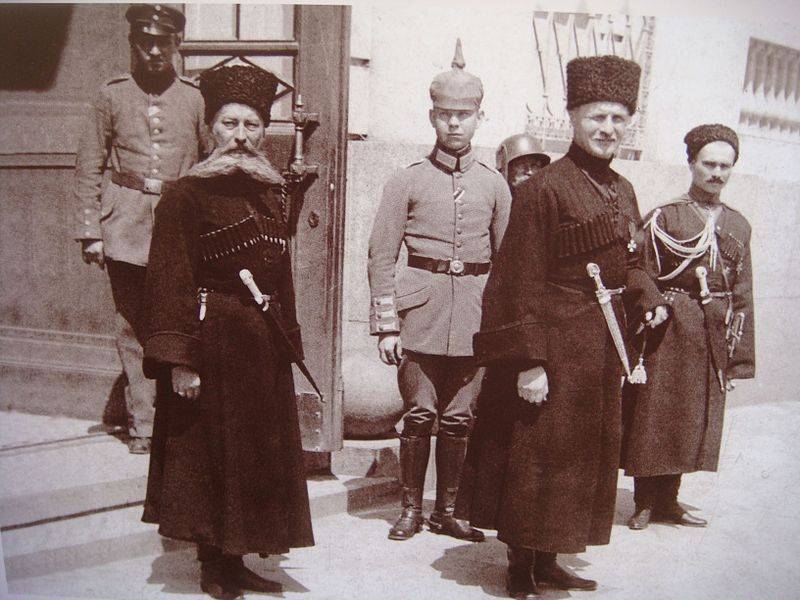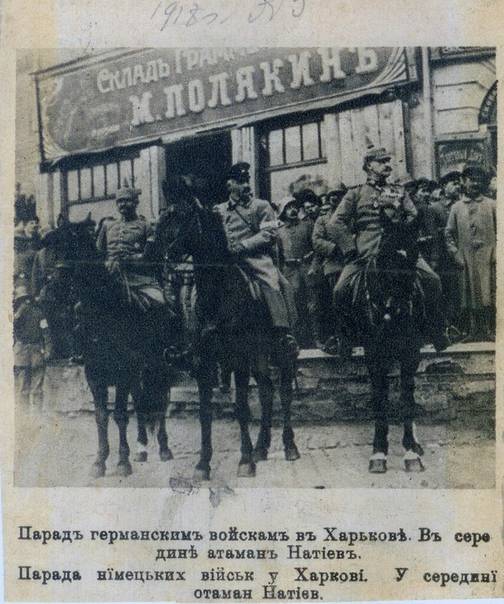How the Germans changed the sign on the map of the southern provinces of Russia

Pavel Skoropadsky (in the foreground on the right) and the Germans. 1918
Occupation of Little and New Russia
Austro-German troops easily occupied Little Russia and New Russia ("Foreigners will help us!" How the Rada sold Russian Ukraine to the Germans; Part 2). The old Russian army was destroyed by the Februaryist revolutionaries, and the new Red Army was in its infancy. The Red Guards could fight the same small, poorly trained and armed detachments of the future "whites", nationalists and just bandits. But nothing could be done against the regular, well-organized, armed and trained troops of Germany and Austria-Hungary.
There was simply no one and nothing to fight. Therefore, the invaders easily and practically without a fight occupied Kyiv, Odessa, Nikolaev, Kherson, Chernigov and Poltava in March 1918. In April, the Germans and Austrians occupied Sumy, Yekaterinoslav and Kharkov. In early May, the German-Austrian troops reached the line Novozybkov - Novgorod-Seversky - Mikhailovsky farm - Belgorod - Valuyki - Millerovo. The Germans did not go further, concluding a truce with the Soviet command.
The Germans moved into the Crimea. Simferopol fell on April 22. Detachments of Crimean Tatars helped the Germans. There was a threat of the fall of Sevastopol and the capture fleet the Germans. Almost immediately it became clear that the peninsula and the main base of the fleet could not be defended. The decomposed Black Sea Fleet, despite the presence of powerful warships, coastal artillery, huge arsenals, numbered crews, could not repeat the heroic defense of the Crimean War model. There were no people ready to organize defense and fight to the death. Therefore, it was decided to withdraw the fleet to Novorossiysk, which was not ready to receive such a number of ships and vessels.
The commander of the fleet, Admiral Sablin, wanted to cheat and ordered the Ukrainian flag to be raised on the ships. Komflot sent a peaceful delegation to Simferopol, but General von Kosch refused to accept it and continued the offensive. Most of the crews refused to raise the flag of Ukraine, and on April 29 - May 2, they took the most combat-ready ships to Novorossiysk. But a significant part of the ships, on which there were not enough people or they needed repair and replacement of mechanisms, was captured by the enemy. So, the Germans captured 7 battleships (for example, Eustathius, John Chrysostom, Rostislav), 3 cruisers, 12 destroyers, 5 mother ships, 3 Romanian auxiliary cruisers. The Ukrainian flag did not help; on May 3, it was lowered on all the captured ships.

Rada is a useless puppet
When the Germans occupied Kyiv, they brought the Central Rada in their convoy. "Ukrainophiles" settled in the building of the Pedagogical Institute on Volodymyrska Street and returned to their usual business - party debates.
The Germans were interested in something else. The real master of the Russian Ukraine was the commander of the Kyiv Army Group, Field Marshal Hermann von Eichhorn. Under his command was an army of 250 thousand bayonets and sabers. On March 28, 1918, the field marshal expressed his opinion on power very clearly:
The Germans quickly put things in order in Kyiv and wanted to solve the food problem. The Central Powers continued the war with the Entente. The economic potential of the German bloc was on the verge of exhaustion. Boys were already being taken into the army, the people were malnourished and were under the threat of starvation. The army and the country needed bread. Therefore, the occupation of Little Russia, which was the breadbasket of Russia, was very helpful.
Berlin's policy was simple. The Germans supported the Rada by force when it had already lost the war to the Bolsheviks due to its extreme senselessness and complete lack of support from the people. The central council was supposed to ensure the supply of food and raw materials. The Germans were in the role of "roof". However, the Germans quickly realized that the Rada was an empty shell. It not only cannot pursue an independent foreign policy, defend itself, but also solve pressing internal problems.
The economy of Little Russia was a real disaster. So, the Ukrainian authorities were unable to establish industrial production in the lands of Novorossia and Donbass occupied with the help of the Germans. In 1916, iron smelting in the Little Russian provinces of the Russian Empire amounted to 18,6 million pounds. In 1917 it was reduced to 14,3 million poods, and in 1918 these figures had already collapsed to 1,8 million poods.
The able-bodied male population was conscripted, fled, the use of female and child labor increased sharply, which led to a sharp drop in labor productivity. Thus, labor productivity in the coal industry in 1918 decreased by 1917 times compared to the level of 9, and by 1916 times compared to the level of 16,5. From January 1 to May 1, 1918, 200 million poods of coal were mined in the mines, for the same period in 1917, 574 million poods of coal were mined.
Things were no better in the agricultural sector. The German authorities tried at any cost to ensure the supply of provisions, raw materials to their homeland. German military courts-martial raged in the village. Naturally, this aroused the resistance of the peasantry. Provisions were exported from the country, goods were not imported. There was a food problem - the threat of general hunger in the richest agricultural region.
As the general and future hetman Skoropadsky rightly noted on this occasion:
Since the Rada cannot manage and organize the flow of grain to Germany, then the "Ukrainian sign" can be changed. Replace with a more capable government.
It should be noted that there was another view of the Ukrainian problem.
Austro-Hungarian troops occupied Odessa and Yekaterinoslav (now the Dnieper). The Austrians wanted to create another "flap" of their empire - a monarchical state headed by a prince from the Habsburg dynasty. This role was to be played by Wilhelm Franz of Habsburg-Lorraine. During the war he served in the 13th Galician Lancers Regiment. Then he was appointed commander of the Sich Riflemen. The archers called him Vasil and put on an embroidered shirt on him, which is why he received the nickname "Vasil the Embroidered".
Change of sign
But the Germans played the first role in the Allied tandem, so the decision was theirs. For the role of the new ruler of the Russian Ukraine, the Germans planned Pavel Skoropadsky - a native of the Little Russian aristocracy, a large landowner, a former adjutant general of the retinue of Tsar Nicholas II, who during the war years commanded a cavalry regiment, brigade, divisions and 34th army corps. At the direction of the Provisional Government and Commander-in-Chief Kornilov, he was engaged in the "Ukrainization" of his corps (1st Ukrainian Corps).
After the October Revolution, Skoropadsky recognized the power of the Central Rada, was appointed commander of all the UNR troops on the Right Bank. However, Ukrainian politicians, who for the most part were "parsleys" and were afraid of the military general, who enjoyed authority in the troops, forced him to resign. Skoropadsky became the leader of the right-wing forces (large landowners, industrialists, merchants, financiers and the military) who wanted an "iron hand".
On April 25, by order of the Central Rada, the banker Abram Dobry was kidnapped, through whom the German authorities carried out some financial transactions. The Kyiv banker was a member of the financial commission of the Rada, the director of a branch of the Russian Bank, and was a member of the Ukrainian-German economic commission. The banker made a "gesheft" with the Germans, which, against the background of the seizure of "surpluses" and the German "order" in the village, angered the nationalists. Dobry also prepared the financial basis for the future "power" of Skoropadsky. Therefore, the operation to capture him was prepared by the head of the Ministry of Internal Affairs, Mikhail Tkachenko, and conducted by the director of the political department of this department, Gaevsky.
This was the reason for the response of Field Marshal Eichhorn. On April 25, an order was issued to protect Kyiv, German field courts were introduced. The Rada protested. On April 28, 1918, a German patrol entered a meeting of the Central Rada, arrested the ministers of the UNR power bloc, and sent the deputies home. There was no resistance. The Rada did not have a real army, and the people were indifferent to this bunch of talkers. There was no serious support from the Rada and in Kyiv itself. At the same time, no one in Kyiv touched the most prominent leaders of the UNR, like Grushevsky and Petlyura.
The next day after the dissolution of the CR in the circus building (which is very symbolic for this era), the congress of Ukrainian grain growers, which united all the opponents of the Ukrainian socialists, landowners, proclaimed Pavlo Skoropadsky the hetman of Ukraine. Surrounded by officer guards, the general himself arrived. He thanked for the proposed power and graciously agreed to accept it. The program of the new government included the promise of land reform in the near future, in the present land ownership was preserved. In the evening, a thanksgiving service was held on Sofiyskaya Square.
Skoropadsky issued the first law of the new state:
Naturally, all this could only happen with the consent of the German military. Therefore, the head of the UNR government, Vinnichenko, called what happened in the circus "a dull German-general operetta." True, the Rada itself was also the same theater.
- Alexander Samsonov
- https://ru.wikipedia.org/
Information